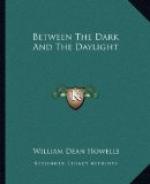“She felt that she was with the only genuine person among those conventional people.”
Halson laughed at Minver’s thrust, and went on amiably: “I don’t suppose that till she met Braybridge she was ever quite at her ease with any man—or woman, for that matter. I imagine, as you’ve done, that it was his fear of her that gave her courage. She met him on equal terms. Isn’t that it?”
Wanhope assented to the question referred to him with a nod.
“And when they got lost from the rest of the party at that picnic—”
“Lost?” Rulledge demanded.
“Why, yes. Didn’t you know? But I ought to go back. They said there never was anything prettier than the way she unconsciously went for Braybridge the whole day. She wanted him, and she was a child who wanted things frankly when she did want them. Then his being ten or fifteen years older than she was, and so large and simple, made it natural for a shy girl like her to assort herself with him when all the rest were assorting themselves, as people do at such things. The consensus of testimony is that she did it with the most transparent unconsciousness, and—”
“Who are your authorities?” Minver asked; Rulledge threw himself back on the divan and beat the cushions with impatience.
“Is it essential to give them?”
“Oh no. I merely wondered. Go on.”
“The authorities are all right. She had disappeared with him before the others noticed. It was a thing that happened; there was no design in it; that would have been out of character. They had got to the end of the wood-road, and into the thick of the trees where there wasn’t even a trail, and they walked round looking for a way out till they were turned completely. They decided that the only way was to keep walking, and by and by they heard the sound of chopping. It was some Canucks clearing a piece of the woods, and when she spoke to them in French they gave them full directions, and Braybridge soon found the path again.”
Halson paused, and I said: “But that isn’t all?”
“Oh no.” He continued thoughtfully silent for a little while before he resumed. “The amazing thing is that they got lost again, and that when they tried going back to the Canucks they couldn’t find the way.”
“Why didn’t they follow the sound of the chopping?” I asked.
“The Canucks had stopped, for the time being. Besides, Braybridge was rather ashamed, and he thought if they went straight on they would be sure to come out somewhere. But that was where he made a mistake. They couldn’t go on straight; they went round and round, and came on their own footsteps—or hers, which he recognized from the narrow tread and the dint of the little heels in the damp places.”
Wanhope roused himself with a kindling eye. “That is very interesting, the movement in a circle of people who have lost their way. It has often been observed, but I don’t know that it has ever been explained. Sometimes the circle is smaller, sometimes it is larger, but I believe it is always a circle.”




